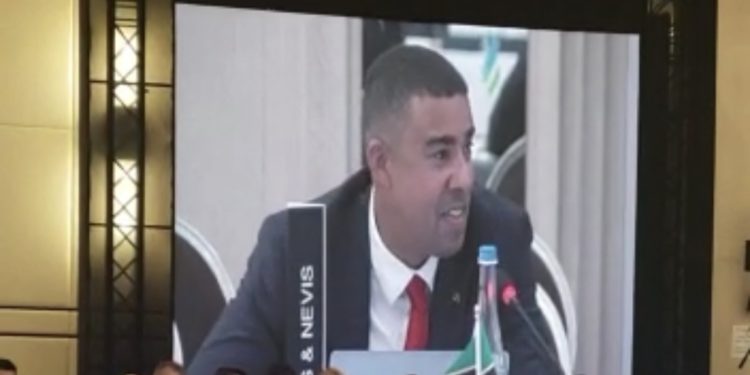BALACLAVA, MAURITIUS, NOVEMBER 23, 2022: During the second day of the week-long Commonwealth Law Ministers Meeting, Senator Hon. Garth Wilkin, Attorney-General & Minister of Justice & Legal Affairs addressed the plenary session on the topic “Commonwealth Anti-Corruption Benchmarks”. The session was chaired by the Attorney-General of Mauritius, Hon. Maneesh Gobin, with the Secretary-General of the Commonwealth, Her Excellency Right Hon. Baroness Patricia Scotland KC also present.
Attorney-General Wilkin told his fellow Commonwealth Law Ministers that the St Kitts & Nevis Government is “committed to substantially reduce corruption and bribery in all forms…and as a first step, my team in the Attorney General’s Chambers is currently finalizing a draft Anti-Corruption Bill to table in our Parliament within the next two (2) weeks.” He added that the Government is “also strengthening our Integrity In Public Life legislation” and that “modernization of our Freedom of Information and Government Procurement Legislation is also on the immediate agenda.”
He continued: “with these actions, we hope to, within the shortest time possible, align with the Commonwealth’s anti-corruption mandate and meet all Benchmarks with the help of our Commonwealth brothers and sisters.”
The Commonwealth has established 25 benchmarks of good anti-corruption practices for national governments and public sector bodies to tackle corruption. According to the Commonwealth Secretariat: “corruption undermines the proper functioning of society. It corrupts government, parliament, the judiciary, law enforcement, public sector functions, private sector commerce, and dealings between private individuals. It results in poor public services and in over-priced and dangerous infrastructure. It damages organisations, resulting in reduced project opportunities and financial loss. It harms individuals, resulting in poor education and health, poverty, hunger, and loss of life. It prevents the proper rule of law so that the innocent and vulnerable bear the consequences while the guilty escape sanction.”
The 25 Commonwealth Anti-Corruption Benchmarks are as follows: Corruption offences, sanctions and remedies; Authority responsible for preventing corruption; Investigation, prosecution, asset recovery and policing; The court system; Parliament; Regulatory authorities; Regulation of financial institutions and the financial system 54; Transparency of asset ownership; Political lobbying, financing, spending and elections; Public sector organisations; Public officials; Issuing permits; Procurement; Contract management; Financial management; Concession management; Asset management; Independent monitoring; Independent auditing; Anti-corruption training; Reporting corruption; Standards and certification; Professional institutions and business associations; Participation of society; and International co-operation.
-30-









